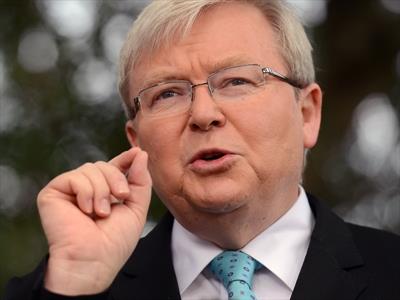
PRIME Minister Kevin Rudd believes he has put together a strong economics team to tackle the threats of the global economy, particularly the end of the resources boom.
Mr Rudd’s new ministry confirms Chris Bowen as treasurer, as well as his expanded portfolio of financial services and superannuation and retains Senator Penny Wong as finance minister.
“We must continue to diversify our economy, not to have all our eggs in one basket,” Mr Rudd told reporters in Newcastle where he announced the ministry on Monday.
The government would do whatever it can to boost manufacturing, services and agribusinesses to generate new jobs rather than simply relying on just one – mining, he said.
However, business is unhappy with a swathe of new outgoings and regulations to mark the start of a new financial year, including a 2.6 per cent increase in the minimum wage and the rise from nine per cent to 9.25 per cent in the compulsory superannuation guarantee.
The Australian Chamber of Commerce and Industry estimates small businesses face a collective $2 billion increase to their payrolls.
“While government politicians have spent months arguing about leadership, an unprecedented wave of anti-business decisions have been made,” the chamber’s chief executive Peter Anderson said in a statement.
Yasser El-Ansary from the Institute of Chartered Accountants Australia urged Mr Bowen in his expanded portfolio to continue with the government’s super and financial services reform agenda to provide the public with confidence in the sector.
Meanwhile, Moody’s Investors Service gave the government a timely slap on the back, affirming the nation’s triple-A rating based on its very high economic resiliency, very high government financial strength and very low susceptibility to event risk.
Mr Bowen said that was testament to the strength of the Australian economy and the government’s fiscal management.
“Australian economy remains the standout performer of the developed world, with solid growth, low unemployment, contained inflation and strong public finances,” he said in a statement.
However, the government is unlikely to gain a further boost from another reduction in the cash rate when the Reserve Bank of Australia (RBA) holds its month board meeting on Tuesday.
Economists believe the recent steep drop in the Australian dollar provides the central bank scope to wait until at least quarterly official inflation figures are released later this month.
“While financial markets are volatile, and domestic politics takes centre stage, we believe it is prudent for the board to remain on the sidelines for now,” TD Securities head of Asia-Pacific research Annette Beacher said in a note to clients.
The TD Securities-Melbourne Institute monthly gauge of inflation shows price pressures remain well within the RBA’s two to three target band.
Inflation in June was unchanged from the previous month, to be 2.4 per cent higher over the year.
Other data also showed an improvement in manufacturing in June, supported by low interest rates and a drop in the exchange rate. – AAP












